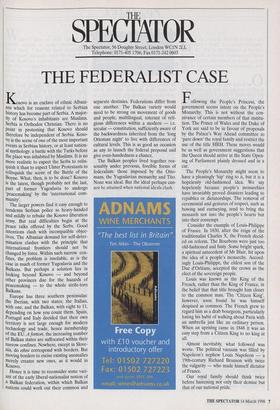SPE CT T HE AT OR The Spectator, 56 Doughty Street, London WC1N 2LL
Telephone: 0171-405 1706; Fax 0171-242 0603
THE FEDERALIST CASE
Kosovo is an enclave of ethnic Albani- ans which for reasons related to Serbian history has become part of Serbia. A major- Its, of Kosovo's inhabitants are Muslims. Serbia is Orthodox Christian. There is no Point in protesting that Kosovo should therefore be independent of Serbia. Koso- vo is the scene of one of the most important events in Serbian history, or at least nation- al mythology: a battle with the Turks before the place was inhabited by Muslims. It is no more realistic to expect the Serbs to relin- quish it than to expect Ulster Protestants to relinquish the scene of the Battle of the Boyne. What, then, is to be done? Kosovo is the latest, though probably not the last, part of former Yugoslavia to undergo `peacemaking' by the 'international com- munity'. The larger powers find it easy enough to condemn Serbian police as heavy-handed and mildly to rebuke the Kosovo liberation army. But real difficulties begin at the peace talks offered by the Serbs. Good intentions clash with incompatible objec- tives. The Albanian demand for self-deter- mination clashes with the principle that international frontiers should not be changed by force. Within such narrow con- fines, the problem is insoluble, as is the case in much of former Yugoslavia and the Balkans. But perhaps a solution lies in looking beyond Kosovo — and beyond other provinces due for the hazards of peacemaking — to the whole strife-torn Balkans. Europe has three southern peninsulas: the Iberian, with two states; the Italian, with one, and the Balkan, with eight to 11, depending on how you count them. Spain, Portugal and Italy decided that their own territory is not large enough for modern technology and trade, hence membership of the EU. A fortiori, the increasing number of Balkan states are suffocated within their narrow confines. Nowhere, except in Slove- nia, do ethni correspond with borders. But moving borders to excise existing anomalies merely creates new ones, as it would in Kosovo.
Hence it is time to reconsider some vari- ant of the early liberal-nationalist notion of a Balkan federation, within which Balkan nations could work out their common and separate destinies. Federations differ from one another. The Balkan variety would need to be strong on movement of goods and people, multilingual, tolerant of reli- gious differences within a modern — i.e. secular — constitution, sufficiently aware of the backwardness inherited from the 'long Ottoman night' to live with differences of cultural levels. This is as good an occasion as any to launch the federal proposal and give even-handedness a chance. The Balkan peoples lived together rea- sonably under previous, forcible forms of federalism: those imposed by the Otto- mans, the Yugoslavian monarchy and Tito. None was ideal. But the ideal perhaps can- not he attained when national ideals clash. Following the People's Princess, the government seems intent on the People's Monarchy. This is not without the con- nivance of certain members of that institu- tion. The Prince of Wales and the Duke of York are said to be in favour of proposals by the Palace's Way Ahead committee to `pare down' the royal family and restrict the use of the title HRH. These moves would be as well as government suggestions that the Queen should arrive at the State Open- ing of Parliament plainly dressed and in a car.
The People's Monarchy might seem to have a pleasingly 'hip' ring to it, but it is a hopelessly old-fashioned idea. We say hopelessly because people's monarchies have invariably proved disasters leading to republics or dictatorships. The removal of ceremonial and gestures of respect, such as bowing and curtseying, tend to bring the monarch not into the people's hearts but into their contempt. Consider the example of Louis-Philippe of France. In 1830, after the reign of the traditionalist Charles X, the French decid- ed on reform. The Bourbons were just too old-fashioned and fusty. Some bright spark, a spiritual antecedent of Mr Blair, hit upon the idea of a people's monarchy. Accord- ingly Louis-Philippe, the eldest son of the Due d'Orleans, accepted the crown as the elect of the sovereign people.
Louis was known as the King of the French, rather than the King of France, in the belief that that title brought him closer to the common man. The 'Citizen King', however, soon found he was himself despised as common. The French grew to regard him as a drab bourgeois, particularly hating his habit of walking about Paris with an umbrella just like an ordinary person. When an uprising came in 1848 it was an easy step from a Citizen King to no king at all.
Almost inevitably, what followed was worse. The political vacuum was filled by Napoleon's nephew Louis Napoleon — a 19th-century Richard Branson with twice the vulgarity — who made himself dictator of France.
Our royal family should think twice before hastening not only their demise but that of our national pride.


































































 Previous page
Previous page